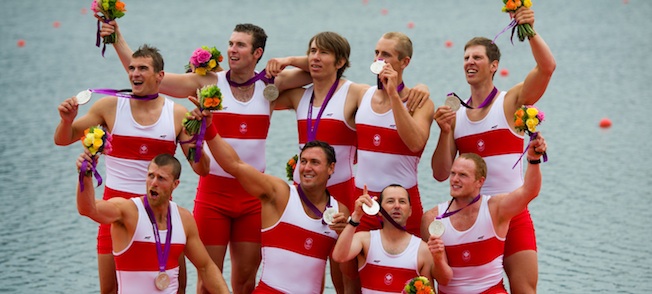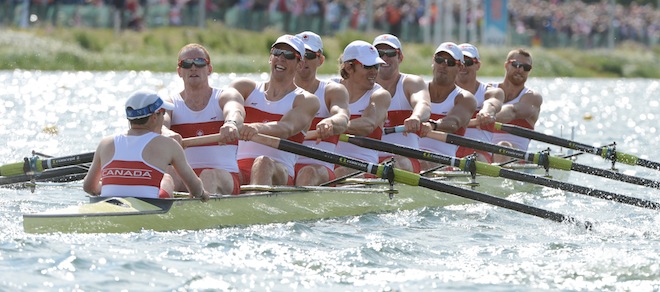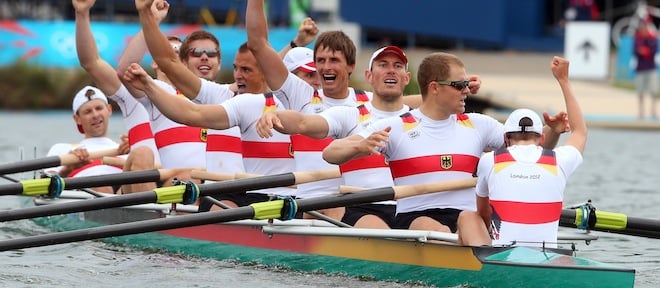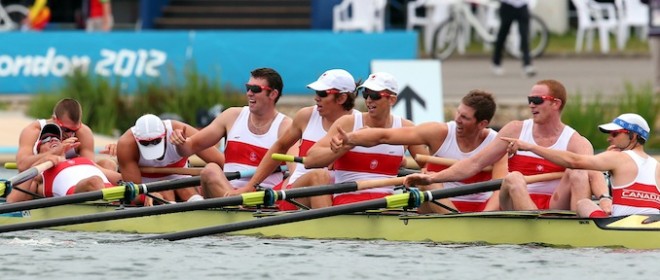Olympic rowing: Inside the 48 hours that inspired the men’s 8 to silver
With exclusive photos from behind the scenes with the team
Practicing on Day 3 at Eton Dorney. (Ezra Shaw/Getty)
Share
Click here for behind the scenes photos with the men’s 8
 How do you turn turmoil into silver? For Canada’s Olympic men’s 8 plus cox rowing crew, this was the plan that got them on the medals float at the Eton Dorney race course Wednesday.
How do you turn turmoil into silver? For Canada’s Olympic men’s 8 plus cox rowing crew, this was the plan that got them on the medals float at the Eton Dorney race course Wednesday.
First, to recap:
This was not the crew that tanked in Athens in 2002, nor the crew that won gold in Beijing, though there are three veterans from that China boat four years ago: Cox Brian Price, Malcolm Howard and Andrew Byrnes. There were doubts about this crew within Rowing Canada. Doubts about their coach, 74-year-old Mike Spracklen, despite his remarkable winning record. Doubts this group had the skill and experience to get on the podium.
This group did not share those doubts. They turned inward. It was Spracklen’s group against the world. And against Germany, the boat that preyed on the minds of every crew here: three world championships, and winners of every race they entered the past three years.
The doubts of many were confirmed Saturday, July 28, when the Canadian crew rowed their first race at Eton. It was a collision of nerves and inexperience: a dismal, confidence-shaking performance, finishing fourth in their heat. “We tried to run with the Germans in the heat and we got burned,” says Howard. “We went for it and we spun out our wheels that really hurt us. We had to come back together as a crew, both mentally and with our plan.”
48 HOURS:
 The next 48 hours were a reclamation project. A time for Spracklen to ease doubts, to build a plan, to offer hope. He knew the physical work was done—no crew trains harder—this was in the head. Tensions eased Monday when the crew rowed themselves into the finals.
The next 48 hours were a reclamation project. A time for Spracklen to ease doubts, to build a plan, to offer hope. He knew the physical work was done—no crew trains harder—this was in the head. Tensions eased Monday when the crew rowed themselves into the finals.
THE GERMANS:

Tuesday eve at the team hotel near the rowing course, Spracklen called a meeting. He faced a conundrum. The German crew loomed large in his crew’s imagination. “What do you say: Hang on a minute you’re not as good as them?” he says. “Or do you say: Yes, you are as good as them. It’s a very fine line the coach treads.”
THE PLAN:
Ignore the Germans. “We didn’t know if we could beat the Germans,” Price admits. “We hadn’t done it. No one else had done it.”
Race the boats you know you can beat, and the rest will sort itself out. That was the plan, more or less, delivered in Spracklen’s soft Buckinghamshire accent.
“He told us, ‘Don’t try to run with them, to run with the Germans, early in the race,’” Howard says. “He said, ‘Just before halfway, fight back. Hit them hard.’”
Then there was the poem. Spracklen always writes a poem. It soothes him and inspires his crews. He touched on the training, and on the qualities of everyone in the boat. He ended this one with an unprecedented request.
THE RACE:
500m, elapsed time: 1:26:13: A solid start. Nothing flashy. The oarsmen, naturally, face backwards. Price as coxswain steers the boat, implements the race plan and calls the play-by-play. He’s tracking the Australians in lane six, they’re off to a good start and he’s using them to set the pace. The Germans on the other side, in lane four, take the lead. Naturally. Great Britain second, Canada third.
1,000m, elapsed time: 2:55.49: The Canadians settle into their pace, slowing to a sustainable speed. Price watches the Australians fall back. The British boat takes an all or nothing run for the Germans. The Canadians ignore that, and maintain the pace: 38 strokes a minute, strong and in control. Germany, Great Britain, Canada in third.
1,500m, elapsed time: 4:32.92: More of the same. Great Britain pushes Germany hard, just 0.27 of a second from the lead. Whoever did that would pay a price, Spracklen had predicted. Hold back, build the foundation. The boats are near the stands, the roar sounds like the landing approach to Heathrow Airport. Price cranks up the volume of the cox box, the boat’s speaker: “You’ve worked hard to give yourselves a shot. You’ve got the shot, let’s get ready to take it.” Germany, Great Britain, Canada in third.
2,000m, elapsed time: 5:49.98: Will Crothers, in the stroke seat, increases the pace, and the rest deliver. Things get intense. Price notices Rob Gibson is close to losing his breakfast. “He’s dry heaving 400 [metres] out, and he doesn’t stop,” says Price. “I’m saying give me more.”
Howard is so amped on adrenalin his pain fades to the distance. Jeremiah Brown describes the last 250m: “I started seeing black spots. That’s when you just get tunnel vision. I trust Brian Price so much. I’d trust that guy with my life to tell me what to do. He said, ‘Boys, we’re down two seats to the Brits, we’re moving.’ I though, OK, let’s get that bronze. “All of a sudden he said, ‘Boys, we’re up a seat on the Brits.’ I thought, holy crap! I thought the other version of the word. Let’s keep going. Let’s see what we can get here. The last 10 he says, ‘We got the silver, we got the silver, we’re pushing the Germans.’”
THE FINISH:

Germany gold, Canada silver, Great Britain bronze.
All six boats finish within three seconds of each other in a race that was a privilege to watch. The Canadian boat erupts with a celebration that rivals the gold medal Canada’s eight won in Beijing. There it was expected, here they exceeded expectations, and rose above the doubts and the doubters.
“We gave ourselves a shot at the Germans but those guys are a class crew,” says Doug Csima. “I don’t know if anyone can beat them. We had the best race we could have.”
Really, that’s all you can ask, though Spracklen—wounded by those who questioned his old-school methods and punishing training regime—had asked even more in his poem.
“What I said was, I have one last request,” Spracklen recalls later. “And I’ve never asked anyone before: Win the race for me.”
Here, by the rowing course, he blinks back tears. And it’s obvious that with that silver, they did exactly that.